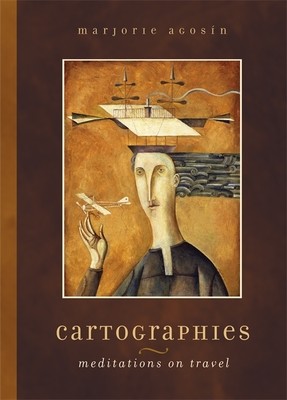
- We will send in 10–14 business days.
- Author: Marjorie Agosin
- Publisher: University of Georgia Press
- ISBN-10: 0820329525
- ISBN-13: 9780820329529
- Format: 13 x 18.4 x 1.5 cm, softcover
- Language: English
- SAVE -10% with code: EXTRA
Reviews
Description
On the impulse behind Cartographies, Marjorie AgosÃn writes, "I have always wanted to understand the meaning of displacement and the quest or longing for home." In these lyrical meditations in prose and poetry, AgosÃn evokes the many places on four continents she has visited or called home. Recording personal and spiritual voyages, the author opens herself to follow the ambiguous, secret map of her memory, which "does not betray."
AgosÃn's journey begins in Chile, where she spent her childhood before her family left in the early days of the Pinochet dictatorship. Of Santiago AgosÃn writes, "Day and night I think about my city. I dream the dream of all exiles." AgosÃn also travels to Prague and Vienna, ancestral homes of her grandparents, and to ValparaÃso in Chile, which received them as immigrants. Kneeling among the yellow mounds at the Terezin concentration camp, where twenty-two of her relatives died, AgosÃn places "small stones, shrubs, the stuff of life on graves I did not recognize." And then on through the Middle East, the Mediterranean, Europe, and the Americas . . . Everywhere, she is drawn to women in whose devotion and creativity she sees a deep vein of hope--from Julia, keeper of the synagogue at Rhodes, to the women potters in the Chilean town of Pomaire. AgosÃn writes of diaspora, exile, and oppression, yet only to highlight the dignity and valor of those who find refuge in their humanity and their art, in community and tradition. Cartographies shows us what can be found when we journey with openness, as approachable to strangers as we are to ourselves.EXTRA 10 % discount with code: EXTRA
The promotion ends in 20d.05:56:53
The discount code is valid when purchasing from 10 €. Discounts do not stack.
- Author: Marjorie Agosin
- Publisher: University of Georgia Press
- ISBN-10: 0820329525
- ISBN-13: 9780820329529
- Format: 13 x 18.4 x 1.5 cm, softcover
- Language: English English
On the impulse behind Cartographies, Marjorie AgosÃn writes, "I have always wanted to understand the meaning of displacement and the quest or longing for home." In these lyrical meditations in prose and poetry, AgosÃn evokes the many places on four continents she has visited or called home. Recording personal and spiritual voyages, the author opens herself to follow the ambiguous, secret map of her memory, which "does not betray."
AgosÃn's journey begins in Chile, where she spent her childhood before her family left in the early days of the Pinochet dictatorship. Of Santiago AgosÃn writes, "Day and night I think about my city. I dream the dream of all exiles." AgosÃn also travels to Prague and Vienna, ancestral homes of her grandparents, and to ValparaÃso in Chile, which received them as immigrants. Kneeling among the yellow mounds at the Terezin concentration camp, where twenty-two of her relatives died, AgosÃn places "small stones, shrubs, the stuff of life on graves I did not recognize." And then on through the Middle East, the Mediterranean, Europe, and the Americas . . . Everywhere, she is drawn to women in whose devotion and creativity she sees a deep vein of hope--from Julia, keeper of the synagogue at Rhodes, to the women potters in the Chilean town of Pomaire. AgosÃn writes of diaspora, exile, and oppression, yet only to highlight the dignity and valor of those who find refuge in their humanity and their art, in community and tradition. Cartographies shows us what can be found when we journey with openness, as approachable to strangers as we are to ourselves.

Reviews